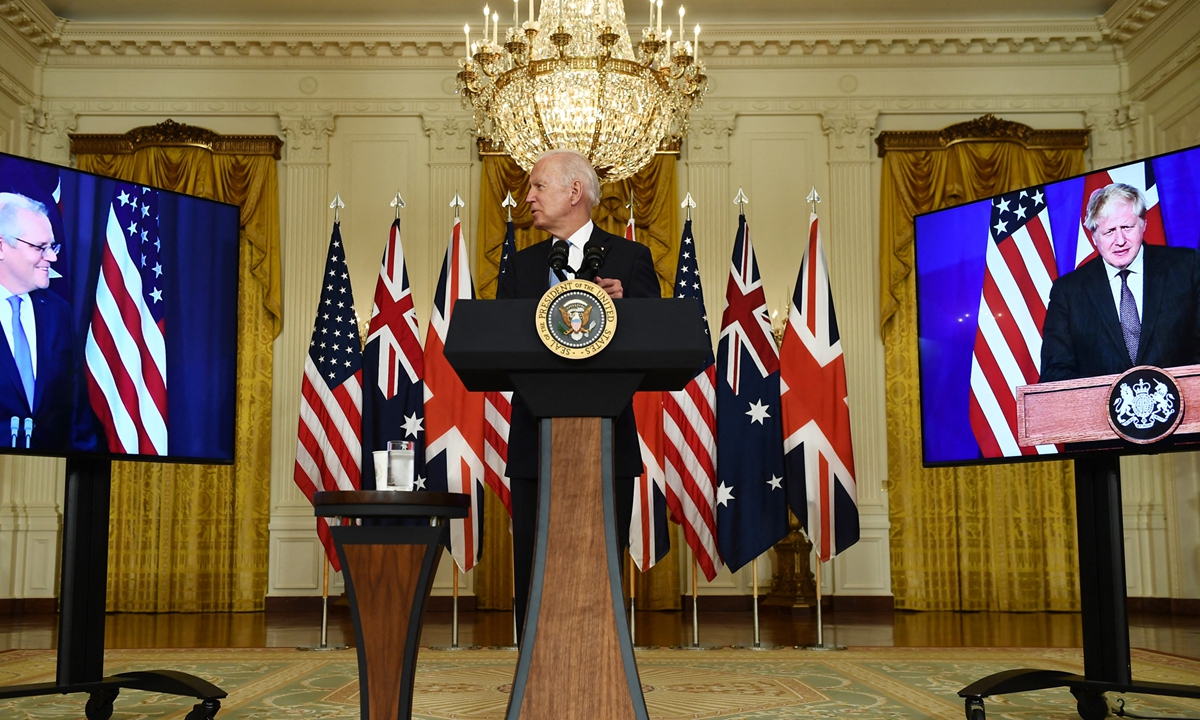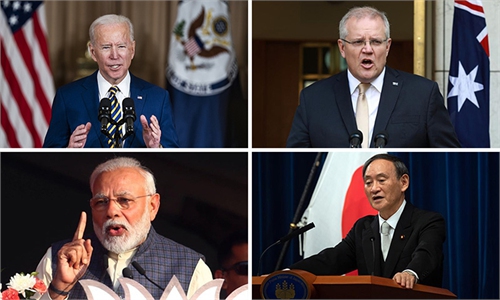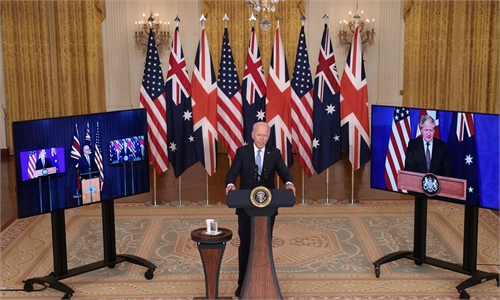
US President Joe Biden participates in a virtual press conference on national security in the White House in Washington, DC, on Wednesday US time, with British Prime Minister Boris Johnson (right) and Australian Prime Minister Scott Morrison in attendance via video link. Biden announced that the US is forming a new Indo-Pacific security alliance with the UK and Australia. Photo: AFP
The newly formed security partnership between the US, UK, and Australia have left many countries with deep concerns, including those in Southeast Asia. For instance, both Jakarta and Kuala Lumpur have voiced their strong opposition to Australia's plans to acquire nuclear submarines under the trilateral pact known as "AUKUS."As a dialogue partner of the Association of Southeast Asian Nations (ASEAN), Australia has not signed the Treaty of Southeast Asia Nuclear-Weapon-Free Zone. But its intention to build nuclear-powered submarines and even to use them in the South China Sea threatens the formation of the regional nuclear-weapon-free zone. Australia's decision goes against one of the major agreements in the Southeast Asia region. This is conflicting with the interests and objectives of ASEAN.
According to the South China Morning Post, some ASEAN members are worried that AUKUS symbolizes the West will deal with China more aggressively by admitting Australia into the nuclear club.
If Australia were to build a nuclear-powered submarine, it would undoubtedly upset the regional balance of power and be a threat to many other regional countries. As a result, the latter might also consider acquiring nuclear submarines to hedge against potential dangers and regain the regional balance. This could lead Southeast Asia to the edge of a regional nuclear arms race.
The establishment of AUKUS is directed at the Taiwan Straits and in particular the South China Sea. By developing nuclear submarines, Canberra will harm the peace and stability in the region. Canberra will also coerce ASEAN to stand with the US and Australia against China. ASEAN members are some of the direct stakeholders in the South China Sea issue. Many Southeast Asian countries are dissatisfied and deeply concerned about Australia undermining the situation of the South China Sea. This explained why Malaysia responded so strongly. Malaysia has been opposed to the display and flaunts of military strength in the South China Sea by major powers. It also objects to turning the region into a venue for a game between great powers.
China today has the absolute military power to control the islands and reefs in the South China Sea region. Yet Beijing has not gone down that path. Instead, it has maintained great patience and restraint in negotiating the Code of Conduct in the South China Sea with ASEAN members. This shows China's responsibility as the largest country in the region. As long as China does not exploit its military strength to seize islands and reefs in the region, AUKUS has barely any reason to exist. In this context, it will be sheer nonsense for AUKUS to regard China as an imaginary enemy and attempt to cooperate with ASEAN to counter China's "aggression" in the South China Sea.
In response to the concerns of ASEAN members, Australian Ambassador to ASEAN, Will Nankervis, is trying to reassure regional partners by stressing that AUKUS "is not a defense alliance or pact." Australia hopes to alleviate ASEAN's concerns about the AUKUS nuclear submarine deal. However, it is difficult for ASEAN to believe Canberra's verbal statement because Canberra's purchase of nuclear submarines has gone too far and runs counter to ASEAN's foreign policy and strategic goals.
ASEAN is at a central position in both the regional security architecture and the economic cooperation architecture in the region. Yet what Australia and the US have been doing undoubtedly weakens the role of ASEAN. Washington and Canberra have always claimed to support ASEAN centrality. But their behavior is actually a slap in the face of ASEAN. Facts have proved that the US and Australia's wordings are very hypocritical. To some extent, the political and strategic trust between ASEAN and Australia and the US has been further jeopardized.
Reports show that Australia's new nuclear submarines would not be in the water until 2040. Yet Canberra will likely use nuclear-powered submarines to coerce ASEAN countries as a bargaining chip. As ASEAN is projected to become the world's fourth-largest economy by 2030, Australia's growing strength in the security field must be a threatening response to ASEAN's growing economic power. This is what countries in Southeast Asia should be highly vigilant about.
The author is director of the Center for Southeast Asian Studies at the Chinese Academy of Social Sciences in Beijing. opinion@globaltimes.com.cn



